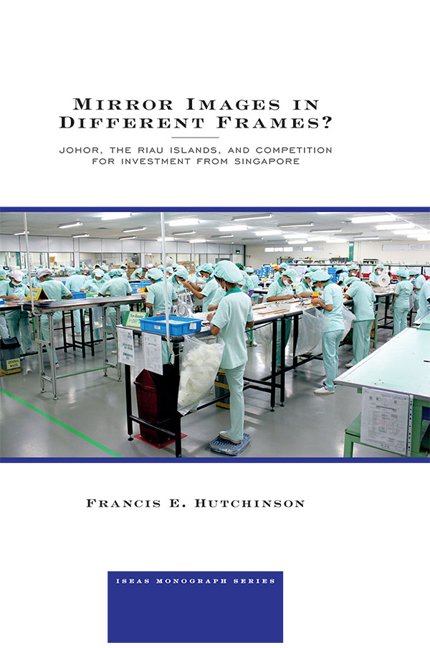 Mirror Images in Different Frames?
Mirror Images in Different Frames? Book contents
- Frontmatter
- Contents
- List of Tables
- List of Figures
- Editorial Note
- Acknowledgements
- About the Author
- List of Acronyms
- 1 Introduction
- 2 Theoretical Framework
- 3 “Internal State Architecture” and Incentive Structures for Meso-Level Leaders
- 4 The Cases: Johor and the Riau Islands
- 5 Conclusion
- Endnotes
- References
4 - The Cases: Johor and the Riau Islands
Published online by Cambridge University Press: 15 November 2017
- Frontmatter
- Contents
- List of Tables
- List of Figures
- Editorial Note
- Acknowledgements
- About the Author
- List of Acronyms
- 1 Introduction
- 2 Theoretical Framework
- 3 “Internal State Architecture” and Incentive Structures for Meso-Level Leaders
- 4 The Cases: Johor and the Riau Islands
- 5 Conclusion
- Endnotes
- References
Summary
The previous chapter has looked at the “internal” state architecture of Malaysia and Indonesia as well as their political contexts in order to identify the implications these have for the incentive structures for regional leaders. With this as the backdrop, this chapter will compare and contrast the cases of Johor and the Riau Islands, seeking to understand when and under what conditions their respective leaders have chosen to pursue industrial transformation.
To this end, the two cases will be compared and contrasted over three periods. The first covers 1990–97, which is characterized by centralized state control and the pursuit of export-oriented industrialization in both countries. The second spans 1998–2003 — a transition period marked by the fallout from the Asian Financial Crisis in both countries, and, in particular, important structural changes in Indonesia — including the emergence of the Riau Islands Province as a discrete political entity. The third period comprises 2004–13, and is marked by direct competition between the two territories with each operating within dramatically diverging incentive structures.
The analysis for each of these periods will involve three parts. First, the context within which Johor and the Riau Islands were operating will be assessed, particularly Singapore's foreign economic policy and bilateral relations with Malaysia and Indonesia, respectively. Second, the political and policy context of each territory will be compared and contrasted, specifically the strategic choices of meso-level leaders — including their vertical strategies for engaging with their respective national governments and local electorates as well as their horizontal strategies for dealing with the private sector. Where relevant, structural changes in each country's internal architecture and, consequently, incentive structures for meso-level leaders will be brought in. Third, the progress of Johor and the Riau Islands towards structural transformation will be assessed, with specific reference to the development of the electronics sector.
1990–97: Mirror Images?
During this period, Johor and Riau Islands operated in similar national and regional contexts. Both Malaysia and Indonesia were authoritarian and centralized, and pursued exportoriented industrialization as a means of accessing markets and technology. Following a recession that hit the two countries in the mid-1980s, they relaxed investment and equity restrictions on foreign capital.
- Type
- Chapter
- Information
- Mirror Images in Different Frames?Johor, the Riau Islands, and Competition for Investment from Singapore, pp. 39 - 128Publisher: ISEAS–Yusof Ishak InstitutePrint publication year: 2015
